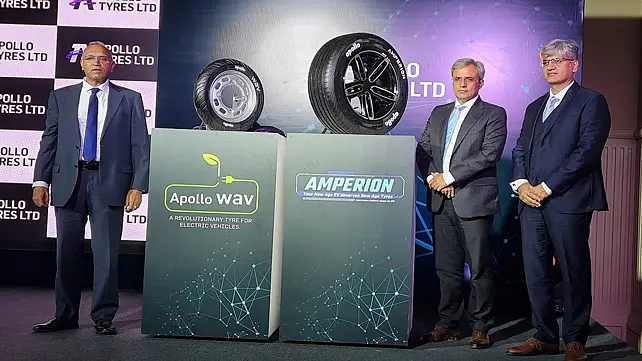
Range anxiety is the biggest hurdle haunting India's dream of shifting to electric mobility. Limited charging infrastructure, safety concerns, and the long recharging time came out to be some of the disadvantages associated with EVs, according to an IACC survey conducted by the Mobility Outlook team.
While equipping electric vehicles (EVs) with heavier batteries is one way of helping address the range anxiety problem, it might not be the best as the same would increase the cost of buying an EV. A simpler way of helping address the problem is having adequate EV charging infrastructure at the discerning locations. Apollo Tyres, in a bid to be a part of the evolving EV economy, and to help increase EV adoption in India, is installing EV chargers at its retail points/dealerships in India.
The company has identified about 100 retail points apt for installing EV chargers, noted Satish Sharma, President - Asia Pacific, Middle East & Africa, Apollo Tyres. He said, 'This is primarily for our commercial vehicle zones. These are big retail points varying from one acre to two acres in size each. It is not mandatory for retailers, but people are opting for it independently.'
Tata Power As Partners
Apollo Tyres has already installed EV chargers at about ten of its retail points and experience zones in India. While the company had introduced this plan primarily aimed towards tyre retail points for commercial vehicles, Sharma highlighted that the company's passenger vehicle tyre partners are also showing interest in setting up similar EV charging points. Notably, Apollo has over 300 PV zones in India.
'I think we are the only tyre company in India doing this. I do not know how many PV points will have the space to have such EV chargers installed, but as an organisation, we are willing to arm our partners with EV charging capabilities,' explained Sharma.
A partnership with Tata Power has already been forged to enable EV charging points at Apollo Tyre dealerships in India. The company is not charging anything from its dealers to install these charging points. However, Apollo Tyres dealers willing to install these EV chargers will have to bear the cost of installing high-tension wires and other prerequisites required for an EV charger.
Tata Power has deployed all types of EV chargers ranging from DC 001, AC, Type2, and Fast DC chargers up to 50 kWh and up to 240 kWh chargers for buses. Sharma further explained that Apollo Tyres is exploring more ways to help increase the adoption of green mobility in the country.
Tyres For EVs
To help address range anxiety in EVs, the company has also recently introduced EV-specific tyres for PVs and two-wheelers. It is worth noting that India sold the most EVs in the two-wheeler category during FY22. Apollo Tyres EV-specific tyres are the first ones in India to be certified five stars by the Bureau of Energy Efficiency (BEE). The company claims that these tyres help increase the battery efficiency of an EV by 5% to 8%. However, there are no plans to introduce EV-specific tyres for the three-wheeler segment in India.
'We are already discussing with automobile OEMs in India to supply these tyres for EVs. We will be targeting the lion's share in the EV space in India, in both PV and two-wheeler segments,' noted Sharma at the EV tyre launch event in Delhi.
Apollo Tyres is now focusing on developing EV tyres for the motorcycle segment. However, the company did not share any retail targets for EV-specific tyres as the segment is still in its nascent stage in the country.
Delhi NCR, Ahmedabad, Bangalore, Mumbai, Pune Jaipur, and Chandigarh are the cities where the company will retail its EV-specific tyres first. Also on the cards is an exploration of new business models for retailing these products in the country.
'Just like consumers, there are early adopters in the dealer space as well. They understand they can make a higher profit by entering a new product line faster than the others. They are the ones who have helped us gain market sharefrom 1% to 20%,' explained Sharma.
EV tyres differ from normal ones in terms of components used, design and construction, explained Hitesh Joshi, Head PV R&D - APMEA, Apollo Tyres. He said,' These tyres also have to be built in a way that there's less noise and more firmness to handle increased acceleration and more weight.'
Joshi also explained that installing these tyres on an internal combustion-engine vehicle will have no negative effects. Instead, it might help increase the mileage due to its low rolling resistance.
The global EV tyres market size, according to Precedence Research, was valued at $40 billion in 2021 and is projected to be worth around $161.6 billion by 2030, growing at a CAGR of 16.78% from 2022 to 2030.